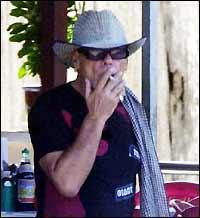The latest from Christopher
on Beirut. A little taste of it.
Lebanon’s capital is once again a tinderbox, ready to blow because of political rivalries exacerbated by sectarian tensions. Increasingly, the political disputes — which are ostensibly over international tribunals, presidential terms and the legitimacy of a government — have grown into religious disputes, mirroring the sectarian tensions between Sunnis and Shi’ites across the region.
Which leader one supporters is often determined by one’s faith. Shi’ites support the Syrian-backed Hezbollah and its leader, Hassan Nasrallah, who has called for the overthrow of the current government as being too close to the United States and cutting Shi’ites out of power for too long. Sunnis, however, support the current government because it is lead by Prime Minister Fuad Siniora, who is a member of the Future Movement, a political party headed Saad Hariri, the son of the murdered ex-premier Rafik, who was killed in 2005.
“The political issues are sectarian,” explained Tariq Tarqawi, 20, who is, in order, a Palestinian, a Sunni and a car electrician. He lives in Ard Jalloul, a mainly Sunni neighborhood that abuts the mainly Shi’ite suburbs of Beirut. “They love Nasrallah, we love Hariri.”














0 Comments:
Post a Comment
<< Home